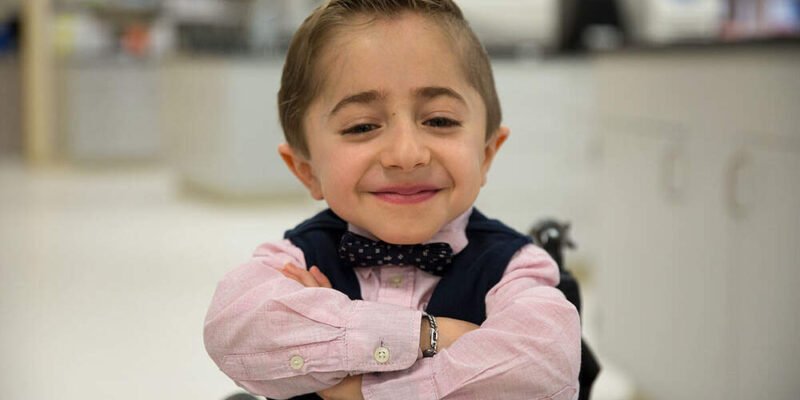Alec Cabacungan and Kaleb Wolf De Melo Torres have become the beloved faces of Shriners Hospitals for Children, appearing in numerous commercials and campaigns that have touched the hearts of many. Their charming personalities and inspiring stories have significantly impacted the public, leading to widespread recognition and support for the organization. This article delves into many people’s questions: do Alec and Kaleb get paid for their commercials? The answer involves an exploration of their roles, compensation, personal motivations, and the broader context of child actors in commercial work.
The Roles of Alec and Kaleb at Shriners Hospitals for Children
Alec Cabacungan and Kaleb Wolf De Melo Torres are more than just spokeskids for Shriners Hospitals for Children; they are ambassadors of hope and resilience. Both Alec and Kaleb were treated at Shriners for their medical conditions—Alec for osteogenesis imperfecta, a genetic disorder that causes brittle bones, and Kaleb for osteogenesis imperfecta and a rare neuromuscular disorder. Their personal experiences with the hospital have made them passionate advocates for the organization’s mission to provide specialized care for children with orthopedic conditions, burns, spinal cord injuries, and cleft lip and palate.
In their roles, Alec and Kaleb participate in a variety of activities beyond appearing in commercials. They attend fundraising events, speak at public engagements, and are featured in online and print campaigns. Their presence is meant to raise awareness and build a connection with the audience, showing the real-life impact of the hospital’s work. Their authenticity and personal stories resonate deeply with viewers, making them effective spokespersons.
The Compensation for Child Actors in Commercials
When considering whether Alec and Kaleb get paid for their appearances, it’s essential to understand the broader context of compensation for child actors in commercials. In the United States, the entertainment industry has specific regulations and standards to ensure that child actors are fairly compensated for their work. The Screen Actors Guild—American Federation of Television and Radio Artists (SAG-AFTRA), a labor union representing performers, often governs these standards.
Child actors can earn varying amounts depending on the nature of the commercial, their role, and the terms of their contracts. For instance, a child actor might earn anywhere from $100 to $500 daily for a commercial shoot. Additional factors, such as residuals for reruns and commercial use in different media, can also affect their earnings. Given their prominent roles in Shriners’ campaigns, it is reasonable to assume that Alec and Kaleb receive compensation aligned with industry standards.
Brand Partnerships and Additional Earnings
In addition to their work with Shriners Hospitals for Children, Alec and Kaleb have partnered with major brands. These partnerships often involve sponsored content, where the spokeskids promote a brand’s products or services in exchange for financial compensation. Alec and Kaleb have collaborated with well-known companies such as Nike, Pepsi, and McDonald’s, leveraging their influence to reach a broader audience.
These brand partnerships are mutually beneficial. For Alec and Kaleb, they provide additional income and opportunities to expand their platforms. For the brands, aligning with Alec and Kaleb offers a way to connect with consumers emotionally, as the spokeskids’ stories are inspiring and relatable. This strategy enhances brand loyalty and visibility, demonstrating the power of influencer marketing.
The Personal Connection and Motivation Behind Their Work
While financial compensation is a factor, Alec and Kaleb’s involvement with Shriners Hospitals for Children goes beyond monetary gain. Their journeys with the hospital have instilled in them a deep sense of gratitude and a desire to give back. Both have spoken openly about how Shriners has transformed their lives, providing them with the medical care and support they needed to thrive despite their conditions.
For Alec, who dreams of becoming a sports broadcaster, his role as a spokeskid has given him invaluable public speaking experience and confidence. He has developed a strong presence on social media, sharing updates about his life and advocating for Shriners. Similarly, Kaleb’s participation in the hospital’s campaigns has allowed him to connect with others facing similar challenges, fostering community and support.
Their genuine dedication to Shriners’ mission is evident in their continued involvement, even pursuing other opportunities. Alec and Kaleb’s work is driven by a heartfelt commitment to helping other children receive the same life-changing care they did. This altruistic motivation underscores their roles as more than just paid actors but as true ambassadors of the hospital’s cause.
The Impact of Alec and Kaleb’s Work on Shriners Hospitals for Children
The contributions of Alec and Kaleb to Shriners Hospitals for Children cannot be overstated. Their presence in commercials and campaigns has significantly increased the hospital’s visibility and public support. Donations and volunteer involvement have surged, enabling Shriners to expand its services and reach more children in need.
Their work has also helped change public perceptions about children with disabilities. By sharing their stories and achievements, Alec and Kaleb challenge stereotypes and inspire others to see beyond physical limitations. They demonstrate that with the proper support and determination, children with disabilities can lead fulfilling and impactful lives.
Moreover, the success of Alec and Kaleb’s campaigns highlights the importance of authentic representation in media. Viewers are more likely to engage with, and support causes that feature real people with real stories. Alec and Kaleb’s authenticity and relatability make them powerful advocates, effectively conveying the importance of Shriners’ mission.
Conclusion
Do Alec and Kaleb get paid for commercials? The answer is yes; they receive compensation for their work, which aligns with industry standards for child actors. However, their involvement with Shriners Hospitals for Children is driven by much more than financial incentives. Their deep personal connections to the hospital and their desire to give back and support other children play a crucial role in their ongoing commitment.
Alec and Kaleb exemplify how personal experiences can fuel passionate advocacy. Their stories resonate with people worldwide, making them effective spokeskids for Shriners Hospitals for Children. While they benefit financially from their roles, their genuine dedication to the hospital’s mission truly defines their work. Their impact exceeds the commercials, leaving a lasting hope, resilience, and compassion legacy.
In conclusion, the relationship between Alec, Kaleb, and Shriners Hospitals for Children is multifaceted. It encompasses professional, financial, and deeply personal elements. Alec and Kaleb’s work as spokeskids is a testament to the power of authentic storytelling and its profound impact on public awareness and support for important causes. As they continue to inspire and advocate, their contributions will remain vital to Shriners Hospitals for Children’s success.
Do Read: Biography of Leonid Monosov













